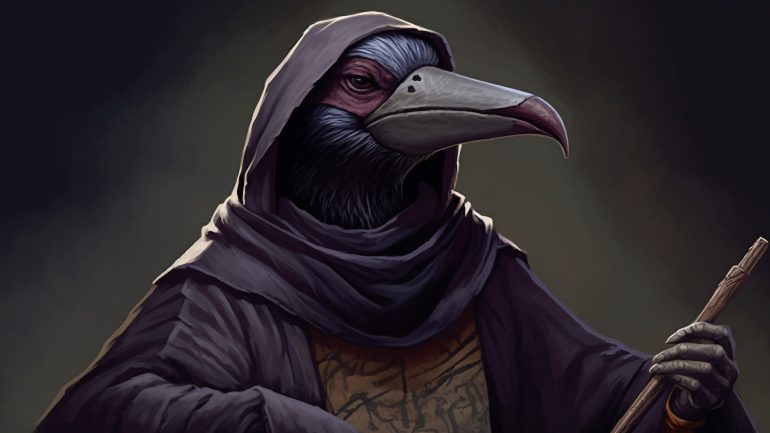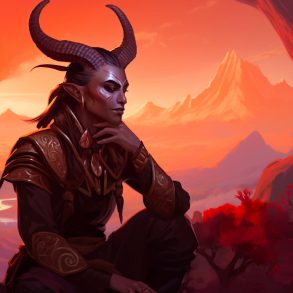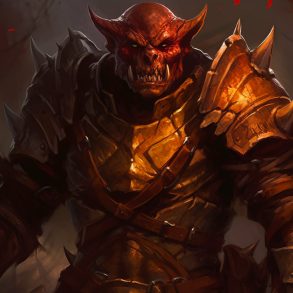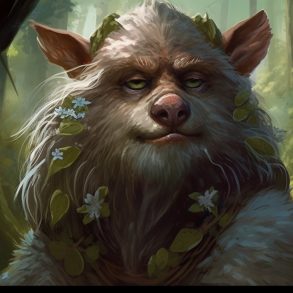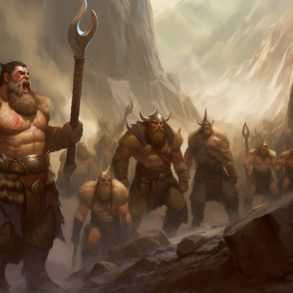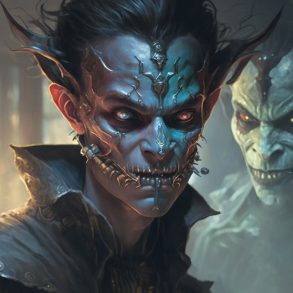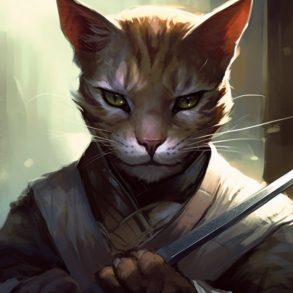Ambition and eternal loss
Kenku are a tragic people: squat birdfolk, they resemble humanoid ravens in appearance and carry a reputation as criminals and monsters, but it wasn’t always this way. Once the Kenku had beautiful wings and adored to fly, serving a powerful master from another plane (who exactly is lost to time) until their ambitions grew too great. Unable to resist a sparkling treasure in their master’s possession, they schemed to steal it and escape to the Material Plane. Before their cunning plan came to fruition however, their master became aware of their treachery and sentenced them to a cruel eternal punishment.
The Kenku forever lost their beloved wings, which withered and fell from their bodies. Their brilliant cunning was the source of their treacherous plan, so the master stripped creativity from their very souls. Finally to ensure that no secrets were divulged in retaliation, their voices were plucked from their throats. This left Kenku unable to speak for themselves, instead unerringly mimicking sounds and phrases they hear in their lives to communicate, forced to follow others and carry out instruction rather than make their own plans. All the while they are drawn to high places, born with a longing for their lost wings and an eye that always casts skyward.
Finding their place and adventuring
Kenku may not be able to create, but they are perfect at the art of imitation, not only through sound but in every aspect. A Kenku can perfectly replicate a book or object countless times without any error, making them perfect scribes and craftsmen for mass manufacture. Unfortunately their skylust makes them uncomfortable in such routines, always longing to find a way to return to the air, be it through spellcasting or any other means. This means that Kenku often fit in with a more unsavoury kind of employment, they take instruction perfectly and their ability to perfectly replicate what they hear and see makes them perfect messengers and scouts. They are readily employed as scouts by thieves guilds, residing in dilapidated towers that couldn’t hold the weight of a heavier folk like humans, calling out birdsong of warning to each other.
Kenku can often be drawn into an adventuring life, the pursuit of flight commonly finds them wishing to learn spellcasting, or attempting to hunt down any magical items that might allow them to fly once more. Adventuring Kenku will often pick a companion, someone they like and feel close to. Their companions’ voice becomes a favourite sound to mimic, and they’ll keep close to them, protecting them with their lives.
Kenku in Wildemount
Kenku are also found in Matt Mercer’s setting of Widlemount, where their origin is given more certain detail. They once served the Raven Queen as her emissaries of death, their voices being heard across all planes to draw the dead to her embrace. During the Calamity they served as her loyal warriors, even saving her from the traitorous god Tharizdun, leaving them swallowed by the void, thought lost to their god. At the end of the Calamity, after the gods had sealed themselves away and defeated Tharizdun, the Kenku reemerged stripped of all of their divine blessings. Their wings and voices were taken from them and their memories of who they once were left behind in the void.
Kenku can be found throughout Wildemount in small numbers, commonly regarded as monsters they keep to themselves and find themselves looking to the sky for something they don’t remember having to begin with.
The Kenku race was first published in Volo’s Guide to Monster (VGtM) and later republished in the Critical Role setting book, Explorer’s Guide to Wildemount (EGtW). An updated version was more recently published in Mordenkainen Presents: Monsters of the Multiverse (MPMM), this is a separate version and does not overwrite the original, it just presents a different way of playing a Kenku using more current design conventions.
Taking flight: Playing a Kenku
Playing a Kenku gives you the following traits:
Ability Scores – Dex +2 Wis +1
Size – Medium
Speed – 30ft
Age – Kenku mature at age 12 and can live up to 60 years
Alignment – Kenku lean towards Chaotic Neutral, generally unable to make lasting commitments and primarily self interested.
Expert Forgery – You have advantage on all checks to make forgeries or duplicates of existing objects.
Kenku Training – You have proficiency in two of: Acrobatics, Deception, Stealth, or Sleight of Hand
Mimicry – You can mimic any sound you’ve heard before, including voices. A creature must succeed an Insight (Wisdom) check contested by your Deception (Charisma) check to detect the ruse.
Languages – You can read and write Common and Auran.
An indelible memory: Playing an MPMM Kenku
Playing a kenku from MPMM gives you the following traits:
Ability Scores – You can increase one ability score by 2 and a different score by 1, alternatively you can increase three different ability scores by 1.
Size – Medium
Creature Type – Humanoid
Speed – 30 ft.
Age – The typical life span of a player character in the D&D multiverse is about a century, assuming the character doesn’t meet a violent end on an adventure.
Expert Duplication – When you copy writing or craftwork produced by yourself or someone else, you have advantage on any ability checks you make to produce an exact duplicate.
Kenku Recall – Thanks to your supernaturally good memory, you have proficiency in two skills of your choice.
Moreover, when you make an ability check using any skill in which you have proficiency, you can give yourself advantage on the check before rolling the d20. You can give yourself advantage in this way a number of times equal to your proficiency bonus, and you regain all expended uses when you finish a long rest.
Mimicry – You can accurately mimic sounds you have heard, including voices. A creature that hears the sounds you make can tell they are imitations only with a successful Wisdom (Insight) check against a DC of 8 + your proficiency bonus + your Charisma modifier.
Languages – You can speak, read, and write Common and one other language that you and your DM agree is appropriate for your character.
I hope that you’ve enjoyed this look into our feathered friends the Kenku, will you be playing a Kenku in your next game? If you’re interested in more 5E races, then check out the Warforged.
